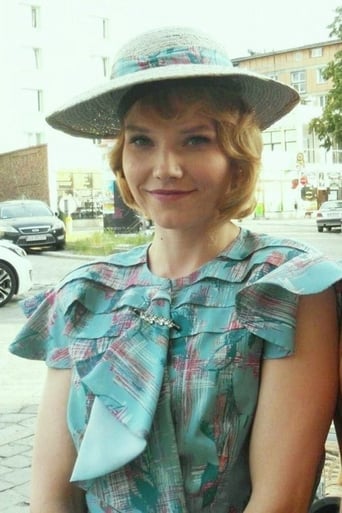ricardoagulha
This is a nice piece of polish cinema with a modern and universal message and theme. A sign of the time. The time of emptiness, loneliness , fear , depression, virtual escapes. Being rich, intelligent and beautiful are just not enough anymore. What can fulfill the void of the soul? Who knows? The movie is not just about a teenager with sexual identity problems being victim of gossip. The hole looks deeper. I think this movie it's a cold one. With cold characters. We cannot fell any sympathy for any of them. They seem strangers and distant people. Personally, I can only despise them. There's nothing about them that can take off tears or laughs from me. This is the impression that I have got after all. Maybe the movie was meant to cause these feelings on its viewers. Maybe to denounce how heartless and careless we can be nowadays. Or maybe we are just watching such a spoiled kid with such spoiled parents that simply don't deserve any pity and if any of them commits suicide or fall from a stair and break the neck... Who would care?
Atish N Ramdonee
I admit having read about the movie prior to watching it, and which brings me to say that the Wikipedia article of it is inaccurate. A low budget movie, but undeniably a good one; I feel that it hasn't been a story dramatic enough, while paradoxically I think that, much have been subtly underlie-d, which may either make it a movie about a guy who who couldn't take it, or about a guy, who is like many of us, or at least shares intrinsic aspects of ourselves, and who couldn't take it despite that he wanted to. A very fine actor, I was nearly convinced that I was watching something/one real, something/one that is actually happening/actually lived and died - it/he had me engrossed. Uhm. 4.8/5
Arcadio Bolanos
Dominik has it all: a wealthy family, good looks, intelligence and a bright and promising future ahead of him. But why does he feel like he's losing his grip on all of it? Popularity seems to elude him, and although a few girls still want to dance with him in parties, he's slowly succumbing to shyness, struggling against minor aggressions from other students, against the seemingly harmless mockery of his peers.Adolescence is always difficult, hormonal changes and new feelings can destabilize anyone. Dominik finds himself exscinded, adrift between two possibilities: What does it mean to be manly? And what does it entail to act effeminately? Gender roles are not unwavering, as they change and evolve through times, through the actions of the people. Gendered behaviors are unnatural: the way in which we learn the performance of gender roles (what we commonly associate with femininity and masculinity) is an act of sorts, a performance, one that is imposed upon us by normative heterosexuality. We are like actors in a stage, trying to persuade others that we are either men or women: we do not follow our natural tendencies but rather the dictates of society.Everything in Dominik's life pertains to the norm; even his parents are ruled by it: they are like slaves following the orders of the marketing industry, in the case of the mother, and the government, in the case of the father. Yes, they have made a fortune, but in order to do so they have obeyed norms for so long that they can no longer feel free. It's this slavery that forces them to assume the heterosexual normativity to the extreme and have sex with anonymous lovers. They need a member of the opposite sex to enforce their roles as productive and successful heterosexual individuals.And that's what's expected of their son. And that's why he cannot reconcile his existential doubts with the demands of adulthood. In her book about Performativity, theorist Judith Butler asks herself to what extent our acts are determined for us, rather by our place within language and convention. For Butler, identity is an illusion retroactively created by our performances. She defines identity as "a compelling illusion, an object of belief" (not unlike Dominik's interpretation of Hamlet). Perhaps in past decades this was harder to understand, but now let's think about the internet and online communities in which we can recreate and reinvent ourselves. That's what Dominik finds in the "Suicide Room", a virtual environment, a rendezvous point for a group of strangers that rely on 'avatars' and online interaction.Although slightly insecure, Dominik is first presented as a 'normal' boy. Nevertheless, everything changes after a party in which two girls kiss each other and then challenge him to do the same with his friend Aleksander. The girls are not lesbians but they are subverting the foundations of heterosexual normativity. In the same way, the two boys kiss each other and personify for a few seconds the abject, id est, the homosexual condition. In order to have a heterosexual normativity there must be something that opposes to it.At the beginning, it would seem like this innocent kiss doesn't disturb anyone. Dominik's friends upload the kiss on YouTube but there are no hard reactions, no negative consequences. It's like a simple, childish joke. That is, until Dominik is wrestling with Aleksander during their judo lessons. Aleksander holds him down, and rubs his body against Dominik, this becomes so arousing for the teenager that he can't help but to ejaculate right there. Aleksander starts laughing about it and Dominik leaves the room instantly, completely humiliated and embarrassed.Aleksander, maliciously, tells everyone about the "semen incident" on Facebook, and the entire school starts laughing at Dominik. The boy is now under a lot of pressure and he cannot cope with it. That's when he finds a safe haven in the "Suicide Room". Let's remember that gender is completely a social construction, a fiction, and therefore open to change and contestation. In a way, this suicidal group is defying every convention; not only are they attempting to end their lives, but they are also computer generated images that have created an entire world online. This idea of identity as free-floating, as not attached to an 'essence', but instead to a performance, is part of the queer theory. And it's also fundamental in order to comprehend Jan Komasa's remarkable film. In the "Suicide Room" there is a Queen and warriors, and soon Dominik becomes a member of this club. Everyone here has, indeed, a floating, virtual identity. And gender rules don't really apply, as the Queen and Dominik have an intense friendship that can never turn into physical love.Just as it happened in the opening frames of the film, there are two parallel sequences: the ones in the real world, and the ones in this non-existent place created thanks to the internet. When Dominik tells his parents that he might be gay, they adamantly refuse to give credit to such possibility. As it has been established, they're so deeply embroiled in the heterosexual normativity that no other alternative can be valid for them. By illustrating the artificial, conventional, and historical nature of gender construction, Butler critiques the assumptions of normative heterosexuality: those punitive rules (social, familial, and legal) that force us to conform to hegemonic, heterosexual standards for identity.Unable to ascribe to predetermined gender roles, Dominik is now a tortured and fragile soul, vulnerable to the influence of this mysterious girl that acts like the Queen of the Suicide Room. But she along with her subjects are no more than phantasmatic projections devoid of any 'realness' or any sexual attributes for that matter. None of this matters to Dominik, who becomes more and more invested in this virtual world, neglecting reality and becoming completely isolated. A true masterpiece from Poland.





